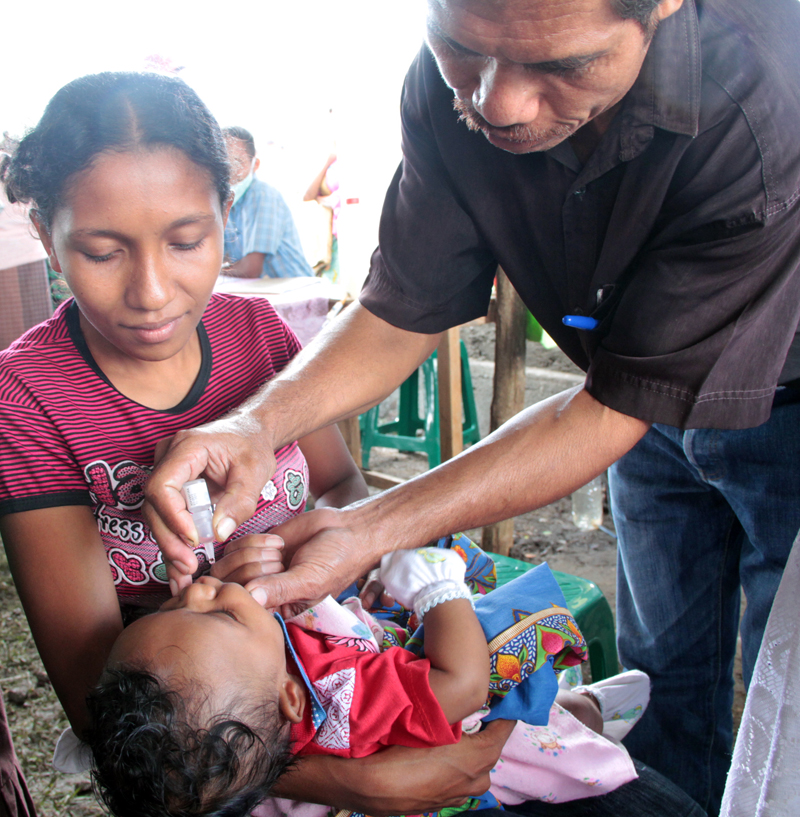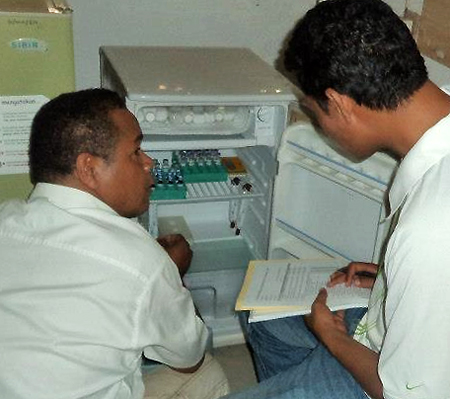It was a lovely, bright morning as I walked beside the broad, blue river that passes through the district town of Viqueque in Timor-Leste. Kids were heading to school in their colorful uniforms, shouting "Bondia!” (“Good morning!”) to me. It made me smile to see them going to school to make their lives and their young country better. At the same time, I worried about the many challenges they face in a country with one of the world’s poorest populations.

A small child is vaccinated in rural Timor-Leste.
As I walked to the district health center in Viqueque where the staff of the immunization project that I lead helps the Ministry of Health to improve immunization services, I wondered if the school kids in the group were fully immunized. Some of the diseases that we treat successfully through immunization in the United States can be deadly in Timor-Leste.
Timor-Leste’s $10.5 million Threshold Program focuses on anti-corruption initiatives and immunization. Under the $2.6 million immunization component, MCC is helping address the country’s low immunization rates by working with USAID and the Timorese Ministry of Health to increase coverage of the measles vaccine and the third dose of the diphtheria-tetanus-pertussis (DTP3) vaccine. The project targets seven of the country's 13 districts, focusing on areas where more than 75 percent of under-immunized Timorese children under 5 years of age live.
The program provides technical assistance to the Ministry to improve the effectiveness, quality and accessibility of immunization services. This involves training staff, developing and applying new tools, providing staff and transport assistance, and coordinating community engagement activities, better reporting, mentoring, and supervision. Project implementers have been working hard to reach hard-to-reach communities by whatever means necessary—on foot, on horseback, by boat, and once by U.S. Navy helicopters.

On the right, Mario Gusmao, Technical Officer for the project, assesses vaccines in a rural clinic.
The immunization program has already produced some impressive results. DPT3 coverage in Baucau, the country’s second largest city, increased from 74 percent when the program began in January 2011 to 100 percent by June 2013.
The program’s success goes beyond Baucau. The Ministry of Health reports a significant increase in immunization coverage in Timor-Leste. DTP3 coverage nationwide increased from 67 percent in 2011 to 78 percent in 2013. The districts that are the focus of the MCC-funded program saw immunization coverage reach 84 percent.
Challenges remain in providing adequate immunization coverage throughout the country. Essential drugs and immunizations are sometimes out of stock. Deliveries of fuel for cold-chain refrigerators are delayed. Vehicles sometimes don't have enough fuel to travel to remote communities. But the Government of Timor-Leste has been working diligently to overcome these obstacles, and I'm happy that I am part of the effort to provide all Timorese a healthier future.

